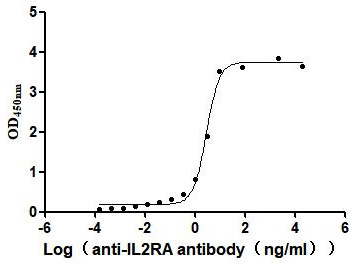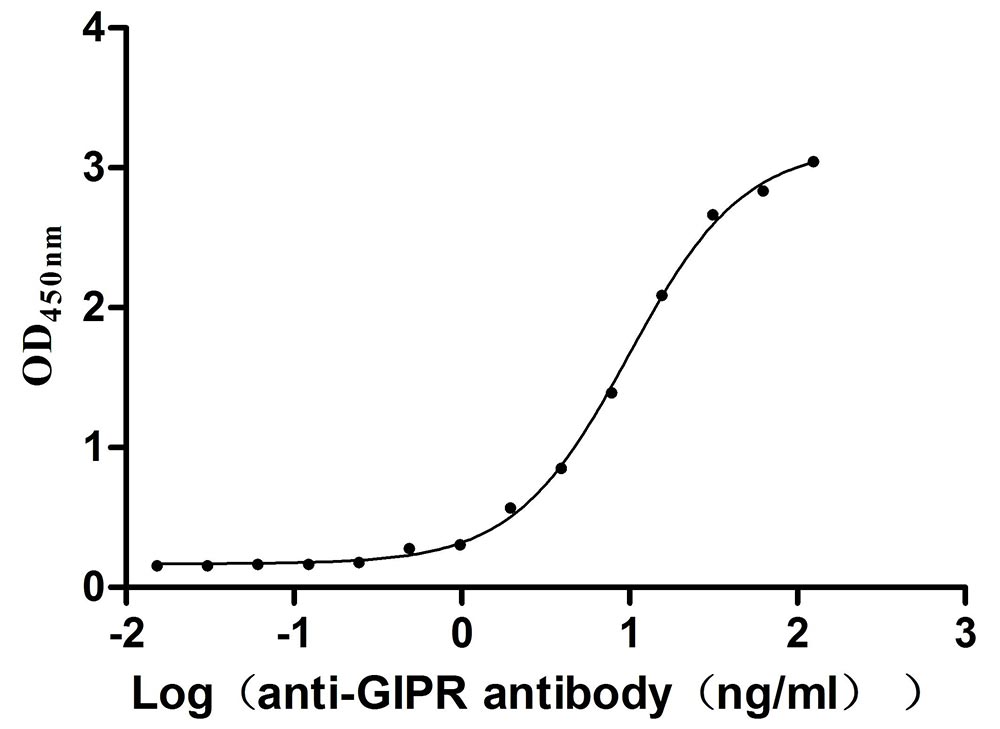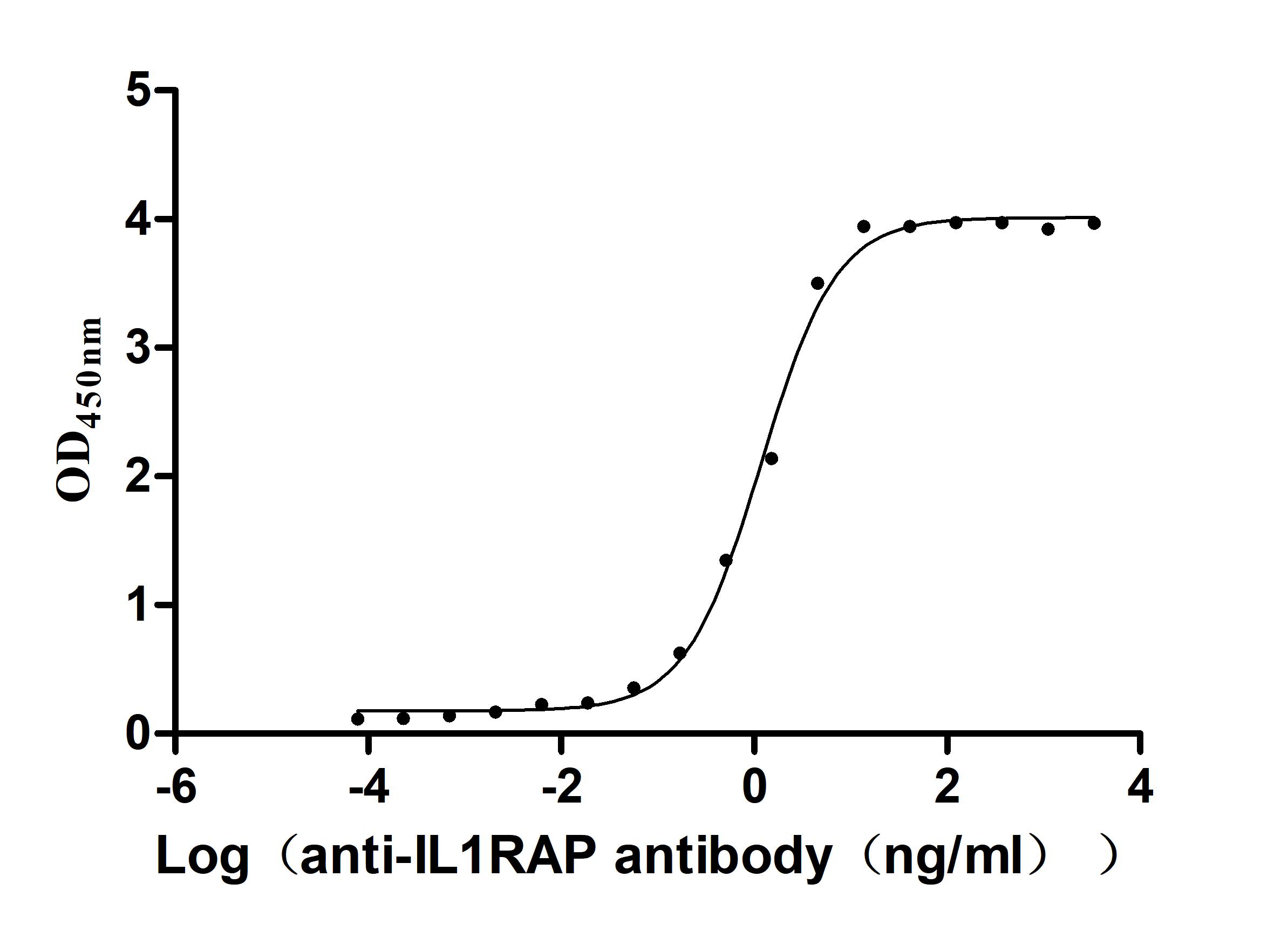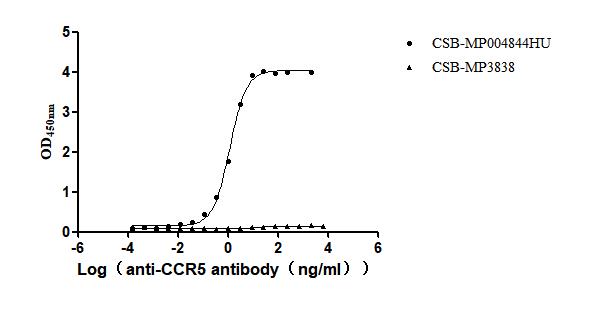Recombinant Mouse C-X-C chemokine receptor type 7 (Cxcr7)
-
货号:CSB-CF006257MO
-
规格:
-
来源:in vitro E.coli expression system
-
其他:
产品详情
-
基因名:
-
Uniprot No.:
-
别名:Ackr3; Cmkor1; Cxcr7; Rdc1; Atypical chemokine receptor 3; C-X-C chemokine receptor type 7; CXC-R7; CXCR-7; Chemokine orphan receptor 1; G-protein coupled receptor RDC1 homolog; RDC-1
-
种属:Mus musculus (Mouse)
-
蛋白长度:Full length protein
-
表达区域:1-362
-
氨基酸序列MDVHLFDYAEPGNYSDINWPCNSSDCIVVDTVQCPTMPNKNVLLYTLSFIYIFIFVIGMI ANSVVVWVNIQAKTTGYDTHCYILNLAIADLWVVITIPVWVVSLVQHNQWPMGELTCKIT HLIFSINLFGSIFFLACMSVDRYLSITYFTGTSSYKKKMVRRVVCILVWLLAFFVSLPDT YYLKTVTSASNNETYCRSFYPEHSIKEWLIGMELVSVILGFAVPFTIIAIFYFLLARAMS ASGDQEKHSSRKIIFSYVVVFLVCWLPYHFVVLLDIFSILHYIPFTCQLENVLFTALHVT QCLSLVHCCVNPVLYSFINRNYRYELMKAFIFKYSAKTGLTKLIDASRVSETEYSALEQN TK
Note: The complete sequence including tag sequence, target protein sequence and linker sequence could be provided upon request. -
蛋白标签:N-terminal 10xHis-tagged
-
产品提供形式:Liquid or Lyophilized powder
Note: We will preferentially ship the format that we have in stock, however, if you have any special requirement for the format, please remark your requirement when placing the order, we will prepare according to your demand. -
缓冲液:Lyophilized from Tris/PBS-based buffer, 6% Trehalose, pH 8.0
-
储存条件:Store at -20°C/-80°C upon receipt, aliquoting is necessary for mutiple use. Avoid repeated freeze-thaw cycles.
-
保质期:The shelf life is related to many factors, storage state, buffer ingredients, storage temperature and the stability of the protein itself.
Generally, the shelf life of liquid form is 6 months at -20°C/-80°C. The shelf life of lyophilized form is 12 months at -20°C/-80°C. -
货期:Basically, we can dispatch the products out in 1-3 working days after receiving your orders. Delivery time may differ from different purchasing way or location, please kindly consult your local distributors for specific delivery time.Note: All of our proteins are default shipped with normal blue ice packs, if you request to ship with dry ice, please communicate with us in advance and extra fees will be charged.
-
注意事项:Repeated freezing and thawing is not recommended. Store working aliquots at 4°C for up to one week.
-
Datasheet & COA:Please contact us to get it.
相关产品
靶点详情
-
功能:Atypical chemokine receptor that controls chemokine levels and localization via high-affinity chemokine binding that is uncoupled from classic ligand-driven signal transduction cascades, resulting instead in chemokine sequestration, degradation, or transcytosis. Also known as interceptor (internalizing receptor) or chemokine-scavenging receptor or chemokine decoy receptor. Acts as a receptor for chemokines CXCL11 and CXCL12/SDF1. Chemokine binding does not activate G-protein-mediated signal transduction but instead induces beta-arrestin recruitment, leading to ligand internalization and activation of MAPK signaling pathway. Required for regulation of CXCR4 protein levels in migrating interneurons, thereby adapting their chemokine responsiveness. In glioma cells, transduces signals via MEK/ERK pathway, mediating resistance to apoptosis. Promotes cell growth and survival. Not involved in cell migration, adhesion or proliferation of normal hematopoietic progenitors but activated by CXCL11 in malignant hemapoietic cells, leading to phosphorylation of ERK1/2 (MAPK3/MAPK1) and enhanced cell adhesion and migration. Plays a regulatory role in CXCR4-mediated activation of cell surface integrins by CXCL12. Required for heart valve development.
-
基因功能参考文献:
- CXCR7 gene overexpression promoted mesenchymal stem cell proliferation and migration, whereas suppressing CXCR7 had the opposite effect. PMID: 29317710
- Study shows that overexpression of CXCR7 in different cellular populations of endometriosis microenvironment may play a role in the pathogenesis and represent a novel target for treatment. PMID: 29587613
- endothelial CXCR7+ cells regulate CXCL12 gradient direction by controlling concentrations near but not far from the vasculature. PMID: 29117251
- High CXCR7 expression is associated with Prostate Cancer. PMID: 28687617
- the data identified the pivotal role of the receptor CXCR7 in pulmonary inflammation with a predominant effect on the pulmonary epithelium and polymorphonuclear neutrophils PMID: 28188248
- CXCR7 expression in adipose tissue macrophages is upregulated in obesity. PMID: 27693695
- Elevated expression of CXCR7 enhances endothelial progenitor cell resistance to diabetes mellitus-induced oxidative damage. PMID: 28137917
- expression of CXCR7 in normal and pathological nervous system suggests CXCR4-independent functions of SDF-1/CXCL12 mediated through its interaction with CXCR7 PMID: 25997895
- Endothelial CXCR7 limits breast cancer metastasis at multiple steps in the metastatic cascade, advancing understanding of CXCL12 pathways in tumor environments and informing ongoing drug development targeting CXCR7 in cancer. PMID: 26119946
- Sata demonstrate that CXCR7 has a role in the positioning of hem and pallium-subpallium boundary-derived Cajal-Retzius (CR)cells, CXCL12 regulating CR cell subpial localization through the combined action of CXCR4 and CXCR7. PMID: 25085881
- CXCR7 acts to prevent epithelial damage and ameliorate fibrosis after a single lung injury, repeated injury leads to suppression of CXCR7 expression and recruitment of VEGFR1 expressing macrophages, Wnt and Notch signaling, and enhanced fibrosis. PMID: 26779814
- CXCR7 overexpression in MSCs reversed the inhibitory effect of high concentrations of SDF-1alpha. PMID: 26303308
- Collectively, our data demonstrate that CXCR7 suppression modulates microglial chemotaxis to ameliorate EAE. PMID: 26607112
- Blockade of CXCR7 suppressed MIF-mediated ERK- and zeta-chain-associated protein kinase (ZAP)-70 activation PMID: 26139098
- Findings indicate that upregulation of CXCR7 expression is associated with tumor invasion in colorectal cancer. PMID: 25051350
- These findings identify CXCR7-mediated STAT3 activation and modulation of the tumor microenvironment as novel regulation of breast cancer growth and metastasis. PMID: 24886617
- CXCR7 has a role in modulating adrenomedullin-mediated cardiac and lymphatic vascular development PMID: 25203207
- CXCR7 plays a role in oligodendrocyte progenitor cell-maturation during remyelination. PMID: 24733828
- CXCR7 regulates blood cholesterol by promoting its uptake in adipose tissue. PMID: 24374972
- Genetic and pharmacologic experiments demonstrated that intermediate opioid peptides secreted from SCH activate CXCR7, a beta-arrestin-biased G-protein-coupled receptor, to augment circadian oscillation of glucocorticoid levels in a paracrine manner and CXCR7 ligand is sufficient to induce anxiolytic-like behavior. PMID: 24315101
- endothelial CXCR7 regulates circulating CXCL12 levels and that CXCR7 inhibitors might be used to block CXCL12-mediated cell migration for therapeutic purposes. PMID: 24116850
- CXCR7 is induced during monocyte-to-macrophage differentiation, which is required for SDF-1 and I-TAC signaling to JNK and p38 pathways, leading to enhanced macrophage phagocytosis PMID: 23599431
- Study suggests that the activation of CXCR7 on tumour blood vessels by its ligands may facilitate the progression of colorectal carcinoma (CRC) within lung but not within liver. PMID: 23169289
- Regulatory pathways targeting CXCR7 C-terminal serine/threonine sites may control the CXCL12 scavenger activity of CXCR7. PMID: 22736769
- Increase in CXCR7 expression is associated with muscular dystrophy. PMID: 22766125
- targeting CXCR7 modifies both disease severity and recovery during experimental autoimmune encephalomyelitis, suggesting a role for this molecule in both phases of disease. PMID: 22145790
- The CXCL11/CXCR7 pathway is involved hepatocellular carcinoma progression. PMID: 21778049
- These data indicate that SDF-1 is a key neuroprotective cytokine secreted by CD133-derived multipotent stromal cells that protects mouse neural progenitor cell through CXCR7. PMID: 20854168
- Data show that the SDF-1alphaCXCR7 signalling pathway regulates genes involved in cell cycle control, amino acid metabolism and ligase activity, which comprise targets that are distinct from those of CXCR4. PMID: 19302186
- Data suggest that CXCR7 is involved in semilunar valve development, possibly by regulating BMP signaling, and may contribute to aortic and pulmonary valve stenosis. PMID: 21246655
- CXCR7 influences leukocyte entry into the CNS parenchyma by controlling abluminal CXCL12 abundance during autoimmunity. PMID: 21300915
- Cxcr7 is necessary to regulate Cxcr4 protein levels, thereby adapting chemokine responsiveness in migrating cells. PMID: 21220100
- whereas CXCR7 protein is expressed by primitive RBCs during murine embryonic development, in adult mammals CXCR7 protein is not expressed by normal peripheral blood cells. PMID: 20889540
- CXCR7 is involved in neuronal cell migration and may act independently of CXCR4 as a mediator of CXCL12 signaling. PMID: 20681075
- CXCR7 regulates the invasion, angiogenesis and tumor growth of hepatocellular carcinoma cells PMID: 20380740
- Data show that beta-arrestin 2 increased uptake of CXCL12 in cells expressing CXCR7, emphasizing the functional relevance of the interaction between CXCR7 and beta-arrestin 2. PMID: 19794961
- Disfrupted cardiac development but normal hematopoiesis in mice deficient in Cxcr7. PMID: 17804806
- Seems to play an unimportant role in bone; however, an important role is indicated for CXCR7 in the cardiovascular system during embryonic and early postnatal development. PMID: 18442043
显示更多
收起更多
-
亚细胞定位:Cell membrane; Multi-pass membrane protein. Cytoplasm, perinuclear region. Early endosome. Recycling endosome.
-
蛋白家族:G-protein coupled receptor 1 family, Atypical chemokine receptor subfamily
-
组织特异性:Not detected in blood, liver, lung and heart, but high expression detected in several tumor cell lines (at protein level). Expressed in heart, spleen, kidney, lung, ovary, brain, testis, astrocytes, neutrophils and B-lymphocytes.
-
数据库链接:
KEGG: mmu:12778
STRING: 10090.ENSMUSP00000069114
UniGene: Mm.491219
Most popular with customers
-
Recombinant Human Tumor necrosis factor receptor superfamily member 5 (CD40), partial (Active)
Express system: Mammalian cell
Species: Homo sapiens (Human)
-
Recombinant Human Cytokine receptor common subunit beta (CSF2RB), partial (Active)
Express system: Mammalian cell
Species: Homo sapiens (Human)
-
Recombinant Human Dickkopf-related protein 1 (DKK1) (Active)
Express system: Mammalian cell
Species: Homo sapiens (Human)
-
Recombinant Human Desmoglein-3 (DSG3), partial (Active)
Express system: Baculovirus
Species: Homo sapiens (Human)
-
Recombinant Human Interleukin-2 receptor subunit alpha (IL2RA), partial (Active)
Express system: Mammalian cell
Species: Homo sapiens (Human)
-
Recombinant Mouse Gastric inhibitory polypeptide receptor (Gipr), partial (Active)
Express system: Mammalian cell
Species: Mus musculus (Mouse)
-
Recombinant Human Interleukin-1 receptor accessory protein (IL1RAP), partial (Active)
Express system: Mammalian cell
Species: Homo sapiens (Human)
-
Recombinant Human C-C chemokine receptor type 5 (CCR5)-VLPs (Active)
Express system: Mammalian cell
Species: Homo sapiens (Human)


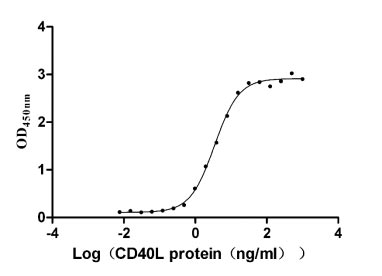
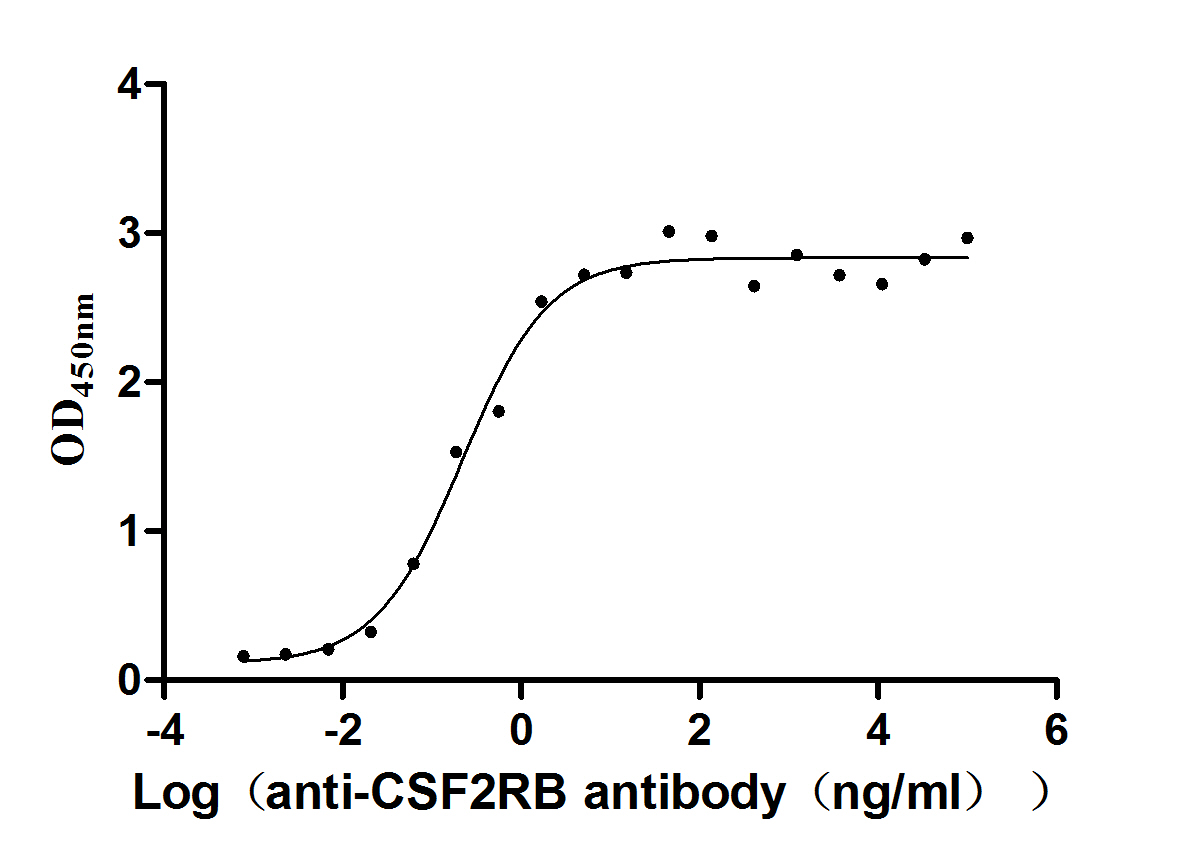
-AC1.jpg)

